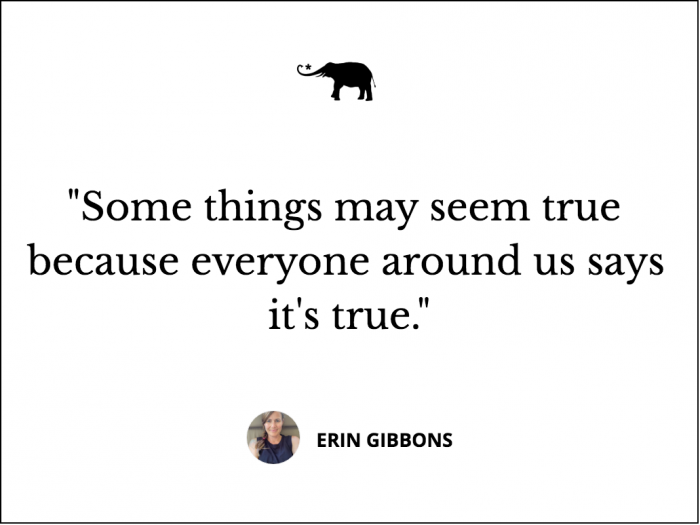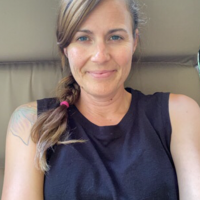View this post on Instagram
“Question everything.”
Have you heard this trending expression lately? I have!
I’ve heard it in podcasts, read it in articles, and seen it on social media. And the message speaks loud and clear to me.
Just because the masses, society, family, and friends say something is true doesn’t mean it is. We believe some things because that was what we were taught from a young age. Some things may seem true because everyone around us says it’s true.
Everyone lives their lives conforming and adapting their lifestyle to match societal beliefs—beliefs that are seen as facts. But the truth is we can question everything! Questioning everything brings up some thought-provoking wonders—about beliefs, facts, what is true, what is a lie, and who gets to decide?
It brings up several things we are taught to believe throughout our lives and how they may not be as true as we may think. Here are some of them:
1. People outside of ourselves are responsible for our feelings.
The truth is no one else is responsible for our feelings. Other people’s words are just that—words. Other people’s actions are out of our control. It’s up to us to interpret another’s actions and words, filter them through our brains, and decide what we think and how we feel about them.
Our thoughts about actions and words are what cause our hurt—not the actions and words themselves. I am not saying people can’t say or do hurtful things—we’re human after all. Humans do and say hurtful things sometimes. And I’m not saying that it’s not okay to allow yourself to be hurt by what someone says or does.
I’m simply saying that we should be aware that another’s actions and words are not the cause of our hurt—our interpretation is. We’ve all been there—we’ve all thought someone else was the reason for our pain. Most of us have been taught this as children, and when we become parents, we teach the same thing to our children.
We teach them not to hurt others’ feelings in many different ways. Essentially, we teach them that in order to be happy, we have to control other people—so we can control our feelings. And that sucks. That leaves us powerless.
In reality, we aren’t in control of anyone but ourselves. That is just the cold hard truth—we simply cannot make anyone do anything they do not want to do.
The reality is we’re suppressing our true feelings. We only say and do things if we are going to get a positive response from someone. We become a chameleon, changing our colors to get a positive response. We are neglecting our true feelings and our true selves by doing this.
This is one of the reasons so many of us don’t truly know who we are. We are so busy worrying about how to behave for others instead of choosing to be authentically us—regardless of how others will feel about it.
There are ways of coming from a place of kindness and authenticity. Is this hard? Hell yes, it’s hard! I am working daily on how to teach my kids to be truthful but also kind. I, myself, am striving daily to be authentic and genuine, which is a real challenge.
Recognizing and becoming aware that we are responsible for our own selves and others are responsible for theirs is a concept that has changed my life. It takes a lot of work, mentally and emotionally, but it is a great weight lifted once we take true responsibility for our own feelings.
Letting go of that blame and becoming accountable for our feelings creates emotional stability and inner strength that cannot be found outside.
2. School, college, and getting good grades are what makes someone smart.
We grow up thinking that there is only one kind of smart—the kind that is measured by your teachers, assessments, and the school system. I know I believed it. But this is not true.
When we don’t feel smart because we don’t measure up to that system or get good grades, it brings up and validates other beliefs that can trickle into our lives—like not being worthy or capable. But there are so many different kinds of intelligence out there. And if we are smart in one way, it doesn’t mean we are smart in other ways.
We need to step away from the belief that we need to get straight A’s and pass all the tests and go to college and get the job. We need to remember that the kind of smart that makes a person able to study, test well, pay attention, and retain what they learn in school is not the only kind of smart.
There are many different kinds of people with different abilities; how could we ever even begin to measure this? There are people who have grit, determination, and drive. There are people who question things. There are people who are creative and think outside the box. That kid watching the clouds? Who knows what his mind is capable of?
3. We should be happy all the time. If we’re not, we’re doing something wrong.
This is a big one. It’s there under the surface in almost everything we consume and the lifestyles we lead. It’s in the way we parent, the way we live, and the way we structure our lives. A lot of the marketing we see is based on this human vulnerability—that we have to strive for and achieve happiness.
We see people around us and think they are happy all the time—we must be doing something wrong. We think we should obtain that feeling 24/7, but is this really true? Do we really want to be happy all the time? Do we want to feel happy when someone we love is gone? Do we want to feel happy when we don’t achieve something we’ve been working toward? Do we want to feel happy when we have a wide array of emotions to choose from? No. We don’t want to feel happy when something happens to us that should naturally cause sadness, grief, frustration, or disappointment.
The purpose of life isn’t to be happy all the time; it is to feel all of our emotions and to live the full human experience—even the negative parts. Life is not all good and not all bad; it’s a mixture. And when we claim we want to feel happy all the time, we miss out on all the other experiences and emotions of life.
We can’t have the good without the bad—there is always a contrast of good and bad in this world. Does this mean we have to ruminate or stew in sadness, grief, frustration, or disappointment? No. We learn to process those emotions, work through them, and come out on the other side. We learn to manage life, manage our reactions, and live in acceptance of it all.
4. We have to do things.
The truth is we don’t have to do anything. We choose to do things. It may sound harsh, but we don’t have to take care of our children, go to work, see family, pay bills and taxes, or be nice. We choose to do these things because of the way they make us feel. We choose to do these things because of the type of person we want to be and the values we want to live by.
The truth is I could move to the Bahamas and never speak to my family again. But do I want to do that? No. I don’t want to be the kind of person who abandons my family. Now, do they drive me crazy sometimes? Yes. Do I get tired of always being needed by my kids and hubby, being the mom taxi cab, feeling like I am always “on” in order to be a good role model and example for my kids? Yes, I do.
But to keep things in perspective, I try to remember that I don’t have to do anything—to be the taxi cab or the mom who is there for my kids and husband. I choose to be this person—there is a difference. When I find myself whining in my head “I have to pick up my kids and shuttle them around,” this is when I realize I need to step back and get some perspective, up my self-care, question if I am taking on too much, ask for help, and/or make sure my boundaries are clear.
5. Your spouse or partner is responsible to meet your needs.
I’m sure a lot of people will disagree with this one, but our spouse or partner is not responsible for our needs and/or happiness. It is our responsibility to meet our own needs, show up authentically in the relationship, and love our spouse or partner for who they are.
Expecting our spouse or partner to be the one responsible for our needs takes all the power away from us and puts it onto their shoulders. Just like them expecting us to be responsible for their needs—it puts a strain on us to always know what they need and/or want, and that’s just impossible.
Being responsible for ourselves and only expecting the other person to love us is so much better! And only having to be responsible for loving the other person as they are is so much more fulfilling. Just be in charge of yourself, own yourself and your needs, and love your spouse or partner unconditionally—that creates an amazing marriage.
(Check out this podcast by The Life Coach School. It helped me understand this idea, and it makes so much sense now.)
6. Drugs are terrible.
The truth is drugs make us feel amazing. They make us feel like we’re much happier than we really are. They make our brains think and feel things that aren’t true. That’s why so many people do them. That’s why so many people get addicted to them. That’s why alcohol and opioid abuse is such an issue in our society.
People do drugs because they take away our inhibitions and make us forget about our problems; they make us feel beautiful and witty. They take our pain away and numb out all the negative. They take away social anxiety and depression and low self-esteem. They take us out of our heads and take away all the worry.
Drugs are terrible because they make our brains feel great…until they don’t anymore. The truth is drugs make us feel amazing in the beginning and terrible later. They turn us into someone we aren’t. They take everything from us when we become addicted—even our true selves.
So when or if we teach our kids about drugs—don’t just tell them that drugs are terrible and they shouldn’t do them. Give your kids an accurate account of what drugs are, what they do to your body and brain so they can make an informed decision.
What are some beliefs in your life that you are now questioning? Is everything true for every person? You decide.
~


 Share on bsky
Share on bsky





Read 2 comments and reply